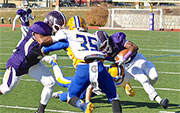- Could Artificial Sweeteners Be Aging the Brain Faster?
- Techniques for Soothing Your Nervous System
- Does the Water in Your House Smell Funny? Here’s Why
- Can a Daily Dose of Apple Cider Vinegar Actually Aid Weight Loss?
- 6 Health Beverages That Can Actually Spike Your Blood Sugar
- Treatment Options for Social Anxiety Disorder
- Understanding the Connection Between Anxiety and Depression
- How Daily Prunes Can Influence Cholesterol and Inflammation
- When to Take B12 for Better Absorption and Energy
- Epsom Salts: Health Benefits and Uses
High School Football Players May Be at Doubled Risk of Migraine


High school football players appear to be twice as likely to have migraines as the average person, which may be due to head injuries and concussions the athletes endure during play, two small new studies suggest.
The first study found that one-third of a group of 74 football players from Louisville, Kentucky-area high schools reported migraine-like symptoms.
“In the general population, anybody out walking the streets in America, there’s a 16.2 percent prevalence of migraine,” said senior researcher Dr. Tad Seifert, director of Norton Healthcare’s Sports Concussion Program in Louisville and head of the National Collegiate Athletic Association Headache Task Force. “We found that almost 34 percent of our players self-reported a history of migraine.”
Even that number is likely understated, said Dr. David Dodick, a concussion expert at the Mayo Clinic and chair of the American Migraine Foundation.
Many players may not realize that they’ve had a concussion or a migraine, Dodick said. If they do, players often don’t report their symptoms to an adult.
“It makes them look like they’re not tough,” he said. “They don’t want to let down their coach. They don’t want to let down their parents. They don’t want to risk their position on the team. So you stick it out.”
In addition, migraine headaches or migraine-like symptoms appear to be the most common symptom suffered by high school athletes following a concussion, the second study found.
The second study included a random sample of 25 teenage athletes treated at the Florida Center for Headache and Sports Neurology. Only 5 percent of players lost consciousness due to a sports-related concussion. But 100 percent experienced a headache either right after the event or during their recovery, the study found.
Four out of five concussed athletes reported that their headache often worsened throughout the day, particularly if they engaged in physical or mental activity, the researchers said.
“We found that everybody we saw had a headache during some part of their sports-related concussion,” said principal investigator Dr. Frank Conidi, main neurologist for the Florida Center. “A majority if not all of the headaches were consistent with migraines.”
The headaches reported shared many symptoms associated with migraines, including sensitivity to light or noise, nausea, vomiting, sleeplessness, distortions of vision and difficulty speaking, the researchers explained.
Research has found that migraines and concussion are interrelated, with one increasing the risk of the other. For example, people with a history of migraine are more likely to suffer a concussion, Seifert said.
Because of that, coaches and team doctors should try their best to identify teenagers who suffer frequent headaches before they take the field, he said.
“That’s an at-risk population that we need to pay a little closer attention to,” Seifert said. “A good, thorough headache history should be a part of any pre-season physical, because they’re at higher risk for concussion and will take longer to recover from a concussion.”
Doctors also need to get better at treating headaches caused by sports-related concussions, Conidi and Dodick said.
“I see a number of these people go on to develop chronic headaches,” Conidi said. “If these people were treated properly initially, they wouldn’t go on to develop chronic headaches.”
Unfortunately, the drugs commonly used to treat and prevent normal migraines don’t always work on migraines that have been caused by a concussion, and research into medications specifically for sports-related headaches has been lacking, Dodick said.
“Post-traumatic headache is a very challenging medical disorder to treat,” Dodick said. “And there hasn’t been a single placebo-controlled study examining any drug used to treat athletes who are experiencing post-traumatic headache. That, in 2015, is incredible.”
Findings from the studies were to be reported Wednesday at the American Headache Society’s annual meeting, in Washington, D.C. Research presented at meetings is considered preliminary until published in a peer-reviewed medical journal.
More information
For more about migraine, visit the American Migraine Foundation.
Source: HealthDay
Copyright © 2026 HealthDay. All rights reserved.










